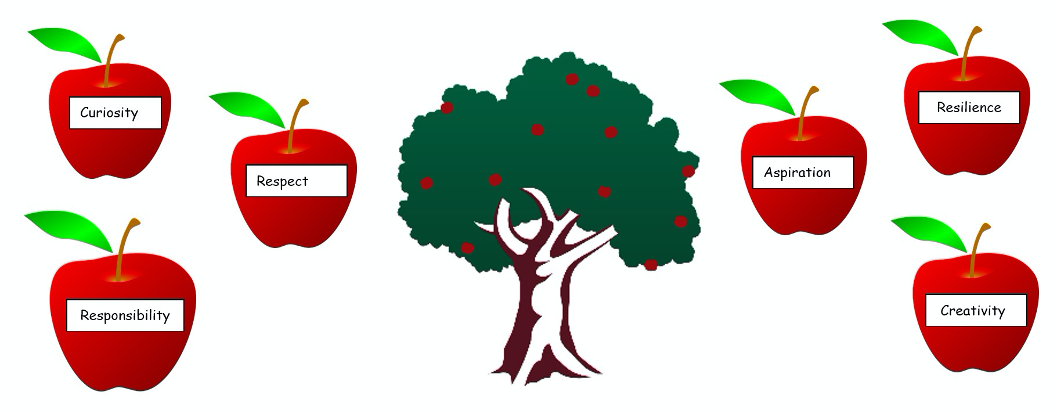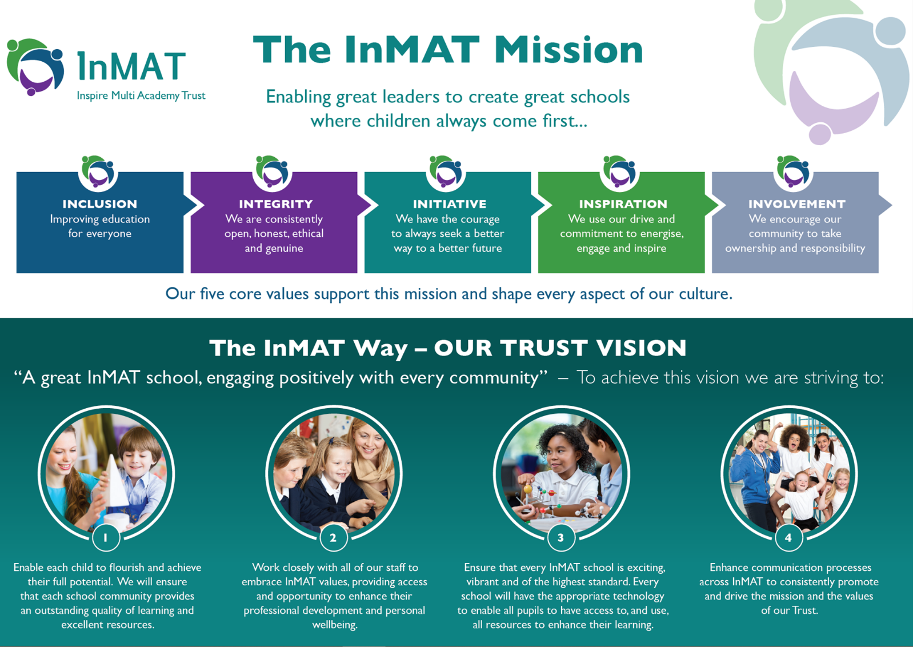Values & Ethos
We nurture, inspire and empower your children to be the best they can be.
Our school mission, strategic aims and curriculum.
Our school community ethos is based on six core elements: aspiration, curiosity, respect, responsibility, resilience and creativity. Whilst we encourage everyone to show these characteristics all year round, we particularly focus on one each half term through classroom practice and assemblies. Adults are expected to model these attributes at all times and reward children for displaying them.

We want our children to leave Ashby Fields Primary School as well-rounded members of the community with a wide range of knowledge and skills which will equip them for secondary school and the wider world. They should be aspirational and know that success is achieved by making mistakes, learning and moving on. We want all our children to know they belong to our Ashby Fields Family, they are important and their voice matters.
Our strategic aims are to nurture, inspire and empower your children to be the best they can be.

Strategic Aims
Our school community ethos is based on six core elements: aspiration, curiosity, respect, responsibility, resilience and creativity. Whilst we encourage everyone to show these characteristics all year round, we particularly focus on one each half term through classroom practice and assemblies. Adults are expected to model these attributes at all times and reward children for displaying them.
We want our children to leave Ashby Fields Primary School as well-rounded members of the community with a wide range of knowledge and skills which will equip them for secondary school and the wider world. They should be aspirational and know that success is achieved by making mistakes, learning and moving on. We want all our children to know they belong to our Ashby Fields Family, they are important and their voice matters.
Community Well-being
Children
We recognise that happy children are our best learners. Therefore, our timetable is designed to include a variety of elements to support emotional and physical well-being. These include: structure and routine clearly displayed and defined each morning with a widget timetable in the classrooms, peer massage to support transition from lunchtime to learning, meet and greet from Bing (our school nurture dog) and the Headteacher every morning, regular use of the all weather track to support the release of endorphins which gives a positive feeling in the body.
Staff
Like our children, happy staff are better teachers. We have invested in a range of strategies to support our staff’s well-being, these include: a trained mental health first aider available for appointments, SLT open door policy, TA appreciation day, all out teaching staff trained together, an annual car rally and regular free strokes of Bing.
Parents and Carers
We also recognise the essential need to work in close partnership with our parents. It is important for them to feel part of our family and able to communicate with us easily. Our parent package includes; a family support worker, direct email addresses to all staff, regular parent partnership meetings, a text messaging service, termly parents into lessons, four annual twenty minute parent consultations and three written reports, regular parent surveys and Twitter updates to share our learning. All this and much more.
It is important for our happy learners to understand that everyone makes mistakes, it is an integral part of the learning process. Learning from our mistakes is essential to becoming a well-rounded citizen.
Restorative Justice
Here at school we use a set of principles and practice that encourages children to take responsibility for their behaviour by thinking through the causes and consequences. This is called Restorative Justice.
In a rules-led system, the tendency is for the teacher to tell the child what they’ve done wrong, and how they’re going to pay for it. The problem with this system is that children don’t learn about the responsibility they had in that situation and how it affected other people, because an adult has intervened and told them what they’ve done wrong.’
Restorative Justice, on the other hand, gives the child a voice and allows them to think through their behaviour, its consequences and what they can do to make it better. It helps us to develop, maintain and repair relationships, building a community based around empathy and self-learning, where children take responsibility for their behaviour.

Our staff are trained to ask the following questions when an incident occurs, and the children are encouraged to think carefully about each one:

British Values
The DfE have recently reinforced the need “to create and enforce a clear and rigorous expectation on all schools to promote the fundamental British values of democracy, the rule of law, individual liberty and mutual respect and tolerance of those with different faiths and beliefs.”
The government set out its definition of British values in the 2011 Prevent Strategy, and these values have been reiterated by the Prime Minister this year. At Ashby Fields Primary School these values are reinforced regularly and in the following ways:
Democracy:
Pupils have the opportunity to have their voices heard through our School Council. The elections of the House Captains are based solely on pupil votes.
The Rule of Law:
The importance of rules, whether they are those that govern the class, the school or the country are consistently reinforced throughout regular school days, as well as when dealing with behaviour and through school assemblies. Pupils are taught the values and reasons behind rules and how they govern and protect us, the responsibilities that this involves and the consequences when rules are broken. Visits from authorities such as the Police and Fire Service are regular parts of our calendar and help to reinforce this message.
Individual Liberty:
Within school, pupils are actively encouraged to make choices, knowing that they are in a safe and supportive environment. As a school we educate and provide boundaries for young pupils to make choices safely, through our provision of a safe environment and through our Community Code. Pupils are encouraged to know, understand and exercise their rights and personal freedoms and advised how to exercise these safely, for example through our E-Safety.
Mutual Respect:
Our school ethos and behaviour policy has evolved from our Community Code and key values. These are a focus for our class discussions and assemblies showing what these mean and how they relate to our daily lives. Our ethos promotes respect for others and this is reiterated through our school rules and our behaviour policy.
Tolerance of those of different faiths and beliefs:
This is achieved through enhancing pupils’ understanding of their place in a culturally diverse society and by giving them opportunities to experience such diversity.


